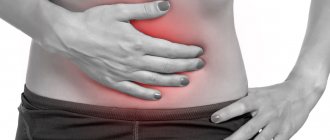H
More articles related to your question
- Anisocoria: why do babies have different pupils?
- "Elkar": why is it prescribed to infants and how does it work?
- Hydrocele of the testicles in a baby: what you need to know about this delicate problem
- Why does a young mother need to take vitamins?
- The baby is capricious: instructions for action
- What is a newborn risk group and why is it important to know about it?
What should you do if your baby’s stomach often growls? In an adult, this indicates hunger or, conversely, that the process of digesting food is in an active phase. But what can the presence of such a phenomenon in a baby indicate?
In the first months of life, newborns may actually have rumbling in their tummy, usually after feeding. But they should not be frequent - that is, if this happens after every meal, it is necessary to look for the cause. Especially if it is noticeable that this process causes discomfort to the baby himself.
Usually the baby's stomach is churning quite loudly - you can hear it even if you are not in close proximity to it, but just next to it. And if you put your hand on your tummy at this moment, you can feel a real storm!
Causes of rumbling in the stomach
What are the causes of rumbling in the tummies of babies, and why does this happen in a newborn, can be explained by the following phenomena that have the presented effect:
- Peristalsis. As soon as the baby has eaten, his digestive system immediately begins to digest the food. Intestinal motility increases, which is why rumbling occurs, and the child feels discomfort in the tummy.
- Change of food . When a baby eats only breast milk, and then the mother starts giving him formula, changes begin in the intestines. The formulas consist of goat and cow's milk, so additional enzymes are required for their absorption.
- Lactose . It is present in all dairy products fed to children. This is milk sugar, for the processing of which special enzymes are produced in the digestive system. Up to 3-4 months, disorders occur in its synthesis, and the digestive system has difficulty coping with lactose, so the baby has colic.
- Colic . Since the digestive system has not yet formed and air is swallowed during feeding, colic occurs in newborns. They begin in most cases after feeding. Gases accumulate in the intestines, which press on the walls of the abdomen and bring pain and suffering to the baby.
- Microflora . At the beginning of a child’s life, the composition of the microflora in the intestines is formed. His sterile body is inhabited by microorganisms. These are beneficial lactobacilli and bifidobacteria, as well as conditionally harmful bacilli, streptococci and others. If there are more harmful microorganisms, then the newborn’s stomach begins to rumble and gurgle. This is complicated by the development of dysbiosis, but this can only be determined by testing. To do this, you need to consult a pediatrician.
- Accumulation of gases in the intestines . It occurs due to the mother’s consumption of foods that cause increased gas formation, as well as when the baby’s body experiences a lack of fluid.
- Hungry rumbling . Small children may have a rumbling stomach due to hunger. At the same time, he cries a lot and screams loudly; he urgently needs to be fed.
When rumbling in a baby’s stomach begins during feeding, this is normal – it means that the digestion process has begun. If these symptoms occur half an hour or more after feeding, then this indicates problems with digestion. To independently identify the presence of pathology, you need to pay attention to the following:
- time of symptom onset;
- simultaneous rumbling with gases or not;
- are there any changes in bowel movements;
- does the baby have colic?
- Is your appetite reduced?
Only a doctor can answer exactly why a child’s stomach is seething, through research. Based on the data obtained, having identified the cause, he can prescribe the correct treatment.
First reason: hunger
If a newborn's stomach growls, this may indicate simple hunger. Surely every person has encountered at least once such a situation when you really want to eat and your stomach seems to start secreting juice. The digestive tract requires nutrition and produces a special rumbling sound.
What to do in this case if the newborn’s stomach is rumbling? The answer is quite logical. The baby needs to be fed. It is worth remembering that breast milk is the most suitable and healthy food for a baby. However, if you do not have the opportunity to establish lactation, then it is worth choosing a suitable adapted mixture. In addition to the rumbling in the stomach, his demanding loud and piercing cry will tell about the child’s hunger.
How to quickly help your child
Parents find it difficult to bear the crying and screams of a small child; they worry and worry, but also strive to help somehow. First, they must carry out organization-wide activities, which they can do independently, without involving a doctor:
- Feed according to the baby's first request, and not according to the clock. A small amount of milk is faster and easier to process than a large portion that the baby will suck as a result of extreme hunger. Express the first milk from the breast, because it collects a lot of substances harmful to the baby’s intestines. Hind milk is much more nutritious and purer.
- As soon as the baby eats, he needs to be held in an upright position for some time so that all the air comes out of the ventricle. Otherwise, it can provoke rumbling in the baby’s stomach and belching with the release of stomach contents.
- Mom should eat right, exclude legumes, spices, various semi-finished products and foods that cause increased gas formation from the diet.
- It is recommended to give your baby dill water or fennel tea to drink. This will help remove excess gases from the intestines. You need to do therapeutic exercises with your baby; every mother can master it easily: pulling the legs to the chest, “bicycle” with the legs. During attacks of colic, you need to stroke the baby’s tummy, put a heated diaper folded several times on it, or place it tummy-on-your-tummy. The baby's tummy will warm up and he will no longer be bothered by painful attacks of colic.
- Do not give your baby juices or similar complementary foods.
- If the cause of rumbling appears to be lactase deficiency (lack of synthesis of the enzyme lactase), then it is necessary to exclude mixtures containing lactose from the baby’s diet. Mixtures without it are available for sale.
- Disturbance of microflora. This can reveal bacterial culture, which is performed in the laboratory of a children's clinic. The doctor will prescribe probiotics and prebiotics to eliminate the problem, as well as special medications to get rid of the infection.
Rumbling and discomfort in the baby's abdomen cease with age. A very young child needs to be picked up more often, turned over onto his stomach and sides, and his tummy massaged. Starting from two months, the baby can be given special medications for rumbling and discomfort in the abdomen.
First aid
In order to influence the cause of strong rumbling that causes discomfort to the child, it is necessary to correctly identify it. To do this, you should consult a doctor. This is the only way to get up-to-date advice and the right methods to eliminate poor health.
Doctors usually call colic the cause of rumbling. In this case, the first aid will be to apply a warm cloth to the baby's stomach, but it should not be hot. To do this, just iron it with an iron. The fabric chosen is only cotton. Then the baby's legs are pressed to the chest.
Drug treatment
The industry produces enough medicines to restore intestinal microflora and get rid of colic and bloating in the smallest children. What medications to take to normalize the digestive system are prescribed by your pediatrician. The most effective are:
- Fennel based products. Available in the form of powder, emulsion or granulated tea. These drugs include: Plantex, Baby Calm.
- Chemicals without negative effects on the body and quickly remove gases from the intestines. The products are available in the form of a suspension for ease of administration by young children. These include: Espumisan, Infacol, Simethicone.
- Probiotics. They are prescribed in case of imbalance of microflora to restore it. Available in powder or capsule form, diluted with water. Infants are prescribed drugs Linex, Bifiform baby. If a child’s stomach is grumbling or rumbling, then it is necessary to take emergency measures so that he does not suffer and recovers faster.
No baby can avoid intestinal problems. Treatment is usually carried out at home, after appointments and with constant supervision by a local pediatrician. To prevent this from happening, it is necessary to apply the preventive measures described above. In the absence of positive dynamics as a result of constantly used preventive measures, it is necessary to urgently undergo an instrumental examination - ultrasound and other methods as prescribed by the doctor.
Main signs and symptoms
Rumbling in the tummy is often accompanied by other symptoms, the presence of which must be paid attention to:
- the child begins to worry even with a light touch on the stomach,
- strong high-pitched crying during feeding or immediately after it,
- sleep disturbance,
- it is difficult to feed the child - he refuses the breast or spits out the pacifier,
- pressing your legs to your tummy,
- the baby often wiggles his legs and arms,
- increased gas formation,
- liquid stool with green or red impurities.
If the listed symptoms are observed for several days, the child must be shown to a doctor, since only a specialist can understand the causes of digestive problems.
Nothing helps!
If none of the above methods help with a turbulent stomach in a newborn, then it is worth trying other ways to normalize intestinal function.
If some methods do not help, you should start using others.
Diet for a nursing mother
A proper diet for a nursing mother is the key to the health of the child.
- The diet should be as balanced as possible.
- It is also not worth introducing exotic and overseas products that rarely appear on supermarket shelves, despite their benefits - the body may react to an unusual product.
- The menu should include dairy products, meat, vegetables (except gas-forming foods such as cabbage), as well as fruits and whole grain bread.
A nursing mother's menu should include dairy products.
Baby feeding regimen
It is necessary to establish a feeding regime for the child.
It is necessary to establish a feeding regime for the child. Lactation consultants note that this is the best prevention of a rumbling stomach and colic in the baby.
Lactase deficiency
If a baby's stomach is rumbling, this may be one of the manifestations of lactase deficiency. In the first months of life, a newborn eats exclusively dairy foods containing lactose. It contains enzymes that help digest food. If these enzymes are not enough in the body, then the baby’s tummy will make a rather strange rumbling sound. In addition, the baby may have too liquid or green stool; while eating, he may abruptly drop his chest, cry, or tuck his legs.
To determine the presence of lactase deficiency, you need to undergo an examination and take urine and stool tests. If the diagnosis is confirmed, the doctor recommends changing the newborn’s diet. Today, there are special adapted milk formulas designed for such children.
Why does a baby's stomach rage?
Today, doctors identify 3 most pressing problems:
- The appearance of dysbacteriosis. There is not enough necessary bacteria in the baby’s gastrointestinal tract that can quickly digest food. To regulate the microflora in the stomach and intestines, pediatricians prescribe special medications to the baby that contain lactobacilli.
- Improper nutrition of the baby (artificial) or mother (with breastfeeding). We know that through its mother's milk, the little baby receives useful vitamins and substances. If this regime is disrupted (the mother began to eat legumes, cocoa, chocolate), then the gastrointestinal tract will react negatively to the food and the child will experience severe colic.
- Frequent spasms in the gastrointestinal tract. They are also one of the reasons why the little one’s tummy is churning. Symptoms include: changes in stool – it smells unpleasant and has a darker color.











